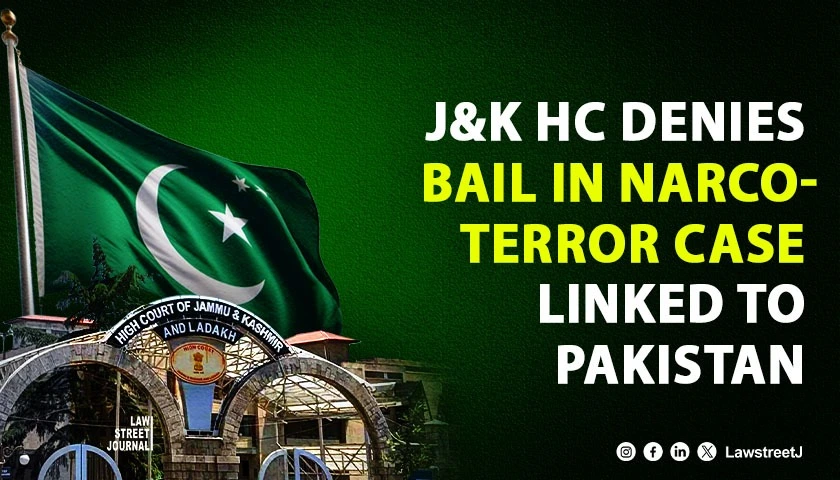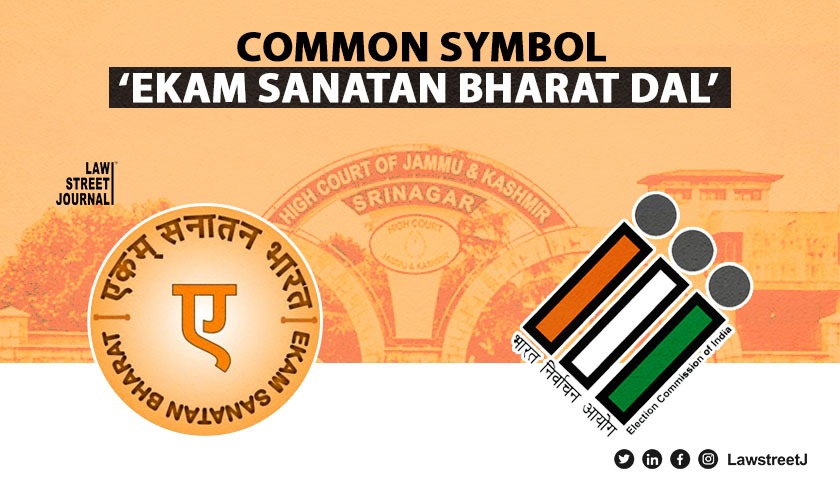Jammu: The High Court of Jammu & Kashmir and Ladakh has delivered a significant judgment rejecting bail for an accused involved in cross-border narco-terrorism, emphasizing that delayed trial alone cannot override stringent bail provisions under anti-terror and narcotics laws.
Justice Shahzad Azeem and Justice Sindhu Sharma made crucial observations on the procedural requirements for granting bail in cases involving terrorism and drug trafficking under the UA(P) Act and the NDPS Act.
The court addressed Criminal Appeal (D) No. 8/2025 filed by Arshad Ahmed Allaie challenging the order dated 24.10.2024 passed by the 3rd Additional Sessions Judge, Jammu, which had dismissed his bail application. The court noted:
“This appeal is directed against the order dated 24.10.2024 passed by the learned 3rd Additional Sessions Judge, Jammu, whereby and whereunder the application for grant of bail in FIR No. 38/2019 under Sections 8/21/22/29 of the NDPS Act and Sections 13/17/21/39/40 of the UA(P) Act came to be dismissed.”
Addressing the specific circumstances of the case, the court observed:
“On checking of the vehicle, one pink-coloured polythene bag containing about 260 grams of heroin was found, along with huge cash in the form of bundles recovered from the bag. Cash amounting to Rs. 12,00,560/- was recovered and seized.”
The court highlighted the serious nature of the allegations, stating:
“During the investigation, some startling revelations are alleged to have surfaced, indicating that the appellant had come into contact with one Naseer Ahmed, the brother of accused Fayaz Ahmed Dar, presently operating from Rawalpindi (Pakistan), and stated to be a trained terrorist.”
In a critical observation on the stringent bail conditions, the court stated:
“The stringent bail provisions under both Acts make it highly challenging to secure bail unless the accused can demonstrate a strong case of innocence or procedural lapses by the prosecution.”
The court emphasized several key legal principles, including the twin conditions that must be satisfied, noting:
“Before considering the plea for granting bail, the appellant must satisfy the twin conditions, which are almost pari materia with those enumerated under Section 37 of the NDPS Act and Section 43-D(5) of the UA(P) Act.”
Regarding the appellant’s plea of delayed trial, the court referenced the Supreme Court judgment in Gurwinder Singh vs. State of Punjab, stating:
“Once the appellant is prima facie shown to be involved in such a heinous crime, the law regarding delayed trial or violation of the constitutional right to a speedy trial would not come to his rescue.”
The court also addressed the fundamental principle of bail jurisprudence in terror cases, observing:
“The conventional idea in bail jurisprudence vis-à-vis ordinary penal offences—that the discretion of courts must tilt in favour of the oft-quoted phrase ‘bail is the rule, jail is the exception’—does not apply while dealing with bail applications under the UA(P) Act.”
In its final directive, the court stated:
“In view of the law governing the subject and the material collected during the investigation, including the evidence of the material witnesses recorded so far, we are satisfied that there is prima facie material on record indicating the complicity of the appellant in carrying out the alleged terrorist activities and drug trafficking to create unrest within the country. Therefore, at this stage, indulgence is unwarranted.”
The court further emphasized that mere delay in trial pertaining to grave offences cannot be used as a ground to grant bail and that the totality of the material gathered by the investigating agency must be considered holistically.
It also noted serious procedural lapses in granting bail to a co-accused, stating:
“The trial court, while granting bail, violated mandatory provisions and failed to discuss the grounds of its satisfaction, despite the rigours of Section 37 being applicable.”
Mr. I.H. Bhat appeared as counsel for the petitioner/appellant, while Mrs. Monika Kohli, Sr. AAG, appeared for the State of the Union Territory of Jammu & Kashmir.
Case Title: Arshad Ahmed Allaie vs. U.T. of Jammu & Kashmir




![Publicly slapping wife does not constitute outraging modesty: J&K HC [Read Order]](/secure/uploads/2024/02/lj_7549_husband-slapping-wife-publicly.webp)
![Jammu and Kashmir High Court Grants Bail To Gang Rape Accused, Emphasizes Presumption Of Innocence [Read Order]](/secure/uploads/2024/05/lj_6000_5007a767-4748-4bed-9dab-8fa14a4d262b.webp)
![Mere involvement of relatives in anti national activities in the past can not be a ground to deny Govt contracts: J&K and Ladakh HC [Read Judgment]](/secure/uploads/2024/06/lj_3301_79dd6df6-5b62-4057-8762-d0e460af98e6.webp)




